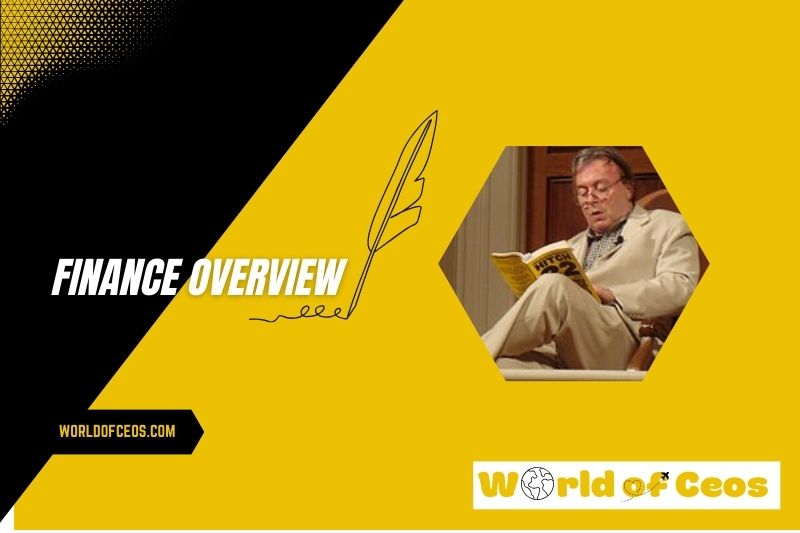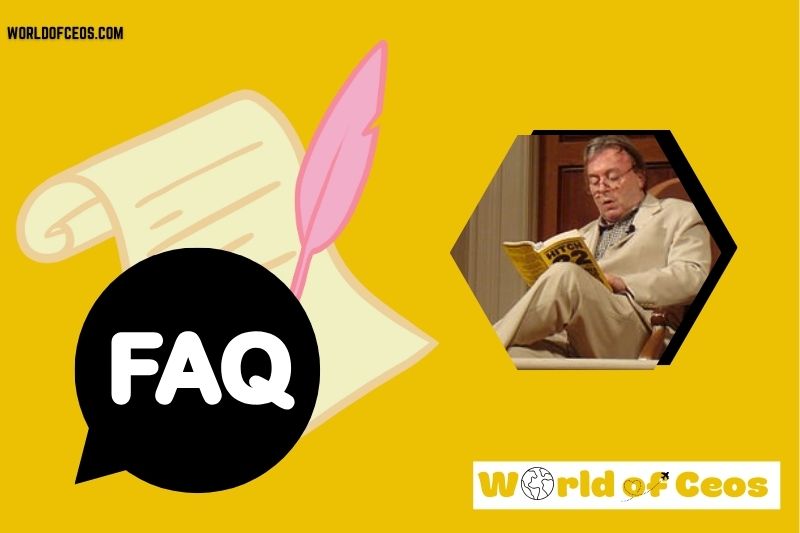Christopher Hitchens was much more than a journalist—he was an influential voice in culture, politics, and atheism.
WorldofCeos takes a deep dive into Christopher Hitchens net worth, examining the career moves, achievements, and ventures that contributed to his wealth.
We’ll look into how his writings, debates, and unapologetic stance on controversial issues built his reputation and contributed to his financial success.
Quick Facts
| FACT | DETAIL |
|---|---|
| Real Name | Christopher Eric Hitchens |
| Popular Name | Christopher Hitchens |
| Gender | Male |
| Birth Date | April 13, 1949 |
| Age | 62 (Died: December 15, 2011) |
| Parents | Eric Hitchens (father), Yvonne Hitchens (mother) |
| Siblings | Peter Hitchens (brother) |
| Birthplace | Portsmouth, Hampshire, England |
| Nationality | British-American |
| Ethnicity | Jewish maternal heritage |
| Education | Balliol College, Oxford (Philosophy, Politics, and Economics) |
| Marital Status | Married |
| Spouse | Carol Blue (m. 1991–2011), Eleni Meleagrou (m. 1981–1989) |
| Children | 3 (Alexander Hitchens, Sophia, Antonia) |
| Dating | N/A |
| Net Worth | $4 million |
| Source of Wealth | Authorship, Journalism, Public Speaking |
| Height | 5 ft 9 in (1.75 m) |
What is the Net Worth of Christopher Hitchens in 2024?

As of 2024, Christopher Hitchens’s net worth remains estimated at around $4 million.
Hitchens accumulated his wealth through a career filled with thought-provoking books, passionate debates, and a fearless stance on controversial issues.
His financial success mirrors the impact of his work, much like other richest authors whose influence endures through their writing and public presence.
Related Figures in Journalism and Writing
- George Orwell
- Richard Dawkins
- Sam Harris
- Daniel Dennett
- Gore Vidal
- Martin Amis
- Noam Chomsky
- Julian Barnes
- Bill Maher
- Tom Wolfe
For more on other writers with comparable influence, check our richest authors page for an extensive list.
Christopher Hitchens Salary and Finance Overview

Early Life and Education: Foundations of His Perspectives and Beliefs
Christopher Hitchens was born in Portsmouth, Hampshire, England, and was educated at Balliol College, Oxford, where he studied Philosophy, Politics, and Economics (PPE).
His intellectual journey began in these formative years, shaped by classic works and powerful experiences that inspired him to question authority.
His background in philosophy and his exposure to political theories would later reflect in his unapologetic writing style, laying the groundwork for his impactful career.
Career Beginnings in Journalism and Media Contributions
Hitchens entered journalism as a correspondent for International Socialism, a British magazine. This role set the stage for his outspoken criticism of public figures and sparked his lifelong commitment to independent thought.
By working with publications like The New Statesman and Daily Express, he established himself as a skilled, unflinching commentator who would later attract attention for his controversial viewpoints.
His early work laid the foundation for his influence in the journalistic world.
Transition to the U.S. and Development of His Writing Career
In 1981, Hitchens transitioned to the United States, where his writing career flourished. He joined The Nation as part of an editor exchange program, marking a period of growth and exposure to American politics and culture.
His work for Vanity Fair and Slate furthered his reach and helped solidify his reputation as a fearless critic. This move not only expanded his readership but also opened new avenues for income, contributing to his overall net worth.
Major Works and Controversial Writings that Defined His Career
One of Hitchens’s most impactful works was his book God Is Not Great, where he argued against organized religion and promoted atheism. This publication resonated with readers and boosted his profile, becoming a significant source of revenue.
His writings on prominent figures like Mother Teresa and Bill Clinton brought attention both for their insight and criticism. Hitchens’s ability to spark debate and challenge conventional thinking helped sustain his career and attract a loyal readership.
Political Views and Public Stances: Influence on Public Discourse
Hitchens was known for his evolution from socialist leanings to supporting U.S. military intervention, especially post-9/11.
His support for the Iraq War and criticism of figures like Noam Chomsky and Gore Vidal positioned him as a unique voice on the world stage.
By continually engaging with complex issues and defending unpopular positions, he not only established his reputation but also garnered public and media interest, which translated into increased demand for his insights and writings.
Recognition and Awards
Throughout his career, Hitchens received notable awards and recognitions, including the Lannan Literary Award for Non-Fiction in 1991 and multiple National Magazine Awards for his columns.
His intellectual achievements and contributions to journalism also earned him a place on the 2005 list of “Top 100 Public Intellectuals” by Foreign Policy magazine.
These accolades underscored his professional impact and helped build his financial legacy.
Personal Life and Relationships that Shaped His Views
Hitchens’s personal life, including his marriage to Carol Blue and friendships with figures like Martin Amis and Ian McEwan, influenced his perspectives and personal style.
His relationships allowed him to debate ideas in depth and added nuance to his beliefs, which he articulated passionately in his writings and public appearances.
Hitchens’s personal experiences were reflected in his work and remain a part of his enduring influence.
Legacy and Cultural Impact on Media, Atheism, and Public Discourse
Hitchens’s influence extends beyond his writings into the fabric of public discourse. As a leading figure in the New Atheism movement alongside Richard Dawkins and Sam Harris, he encouraged critical thinking and debate.
His concept of Hitchens’s Razor has influenced philosophical discussions, while his approach to contentious topics paved the way for future journalists to embrace a bold, critical perspective.
FAQs about Christopher Hitchens

What inspired his career in journalism?
Hitchens was inspired by the works of James Cameron, a renowned journalist whose storytelling motivated Hitchens to pursue journalism. He aimed to address issues others might shy away from.
Why did he support the Iraq War?
Hitchens viewed the Iraq War as part of a necessary fight against authoritarianism, often clashing with other liberals over this stance. His perspective evolved from his belief in challenging oppressive regimes.
What was his relationship with religion?
A staunch atheist, Hitchens saw religion as authoritarian and harmful, famously debating against it in his book God Is Not Great and in public debates with religious figures.
How did his family background influence him?
Hitchens’s parents, particularly his father’s military background, influenced his understanding of authority and duty. His education in philosophy and politics deepened his intellectual perspective.
What are some of his most significant works?
Notable works include God Is Not Great, The Missionary Position, and No One Left to Lie To. These books reflect his views on religion, ethics, and public figures.
Did he receive any major awards?
Yes, he won the Lannan Literary Award for Non-Fiction in 1991 and the National Magazine Award multiple times, acknowledging his contributions to journalism.
What was his stance on social issues?
Hitchens supported causes such as same-sex marriage and free expression. However, his views were complex, and he often examined social issues from multiple perspectives.
Who were his closest intellectual peers?
Hitchens was close with figures like Richard Dawkins, Martin Amis, and Sam Harris, with whom he shared debates and intellectual pursuits.
How did he handle controversies?
Hitchens embraced controversy, viewing it as part of his mission to challenge authority and popular opinion. He often welcomed public debate on contentious issues.
Conclusion
Christopher Hitchens remains a fascinating figure in journalism and public debate.
I’d love to hear your thoughts—drop a comment, share the article, or explore more on worldofceos!

